8 Ways to Stop Water Leaking Into Your Basement
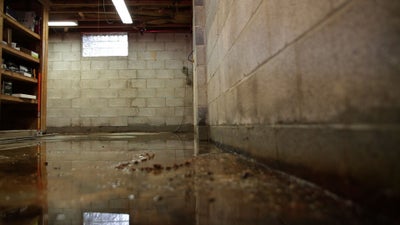
Depending on your perspective, water can have a calming effect or be a source of stress. The latter is certainly the case when it leaks into your basement, causing flooding and other damage.
If a wet basement is ignored, it can lead to various health, structural, and safety issues. But don’t panic—you can ensure your basement stays dry with efficient basement waterproofing solutions. We’ve created this helpful guide that explains basement leaks and how to fix them. Find out what functions well and what doesn’t, as well as how Groundworks experts may assist.
Common Causes of Basement Leaks
First things first, let’s cover why you have water in your basement. Basement leaks can be caused by many sources, including:
- Poor drainage and landscape grading
- Damaged gutters and downspouts
- Hydrostatic pressure
- Basement wall or floor cracks
- Internal plumbing leaks
It can sometimes be difficult for homeowners to pinpoint the precise source of the leak. With over 30 years of experience serving Northern and Southern Alberta, Groundworks can determine the underlying cause and recommend the best solution for your home.
Prevent Leaks & Protect Your Basement: 8 Essential Tips
To assist you in successfully preventing water from entering your basement, we’ve put together this list of useful tips:
Maintain Your Home’s Exterior
To prevent basement leaks, ensure your home’s exterior is effectively maintained with the following:
1. Proper Landscaping
The soil around your home should have a positive grade, meaning it slopes away from the structure to encourage water to flow away from the foundation. Otherwise, water can pool next to the basement walls and leak inside. It’s best to hire a professional landscaper to regrade your yard for optimal drainage.
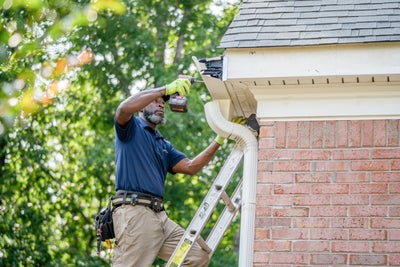
2. Functioning Gutters and Downspouts
Similarly, clogs from debris and other damage to your gutters and downspouts can send rainwater water directly to your basement walls. Regularly clean and maintain these systems to channel rainwater away from your home effectively. This can be tricky, so consider hiring a professional for cleaning, repairs, and replacements.
3. Window Wells
If your basement has windows and window wells, regularly clean, seal, and repair them. Window well covers also provide extra protection from leaves, debris, and critters.
4. Exterior Drainage and Damp Proofing
While often installed during construction, drainage pipes next to the foundation’s footing can clog or get crushed over time. The tar coating or damp proofing applied to exterior walls can also deteriorate. Replacing these is an option, but these projects can be costly and damage landscaping.
Waterproof Your Basement
Consider these essential water management measures to keep your basement dry:
5. Avoid Waterproof Sealants and Paints
Many materials like paint or sealant available at big-box stores are marketed as “waterproof.” They may appear to be easy, quick fixes, but they are only temporary solutions. These coatings can flake off and bubble, allowing moisture to seep through.
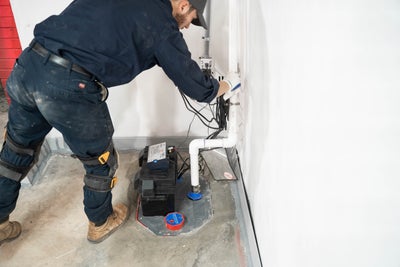
6. Install Interior Drainage Systems
Exterior systems aren’t always the answer, but their internal counterparts offer the best protection for your home. A sump pump, placed at the lowest part of your basement, collects and channels excess water away from your home. It works best with an interior drainage system that collects water leaking through the walls, floor, and cove joint.
7. Control Internal Moisture
High humidity levels in your basement can lead to condensation, even without visible leaks. A dehumidifier and wall vapor barrier help reduce and control humidity levels, making your basement less prone to dampness and mold.
Protect Your Home the Right Way
Fixing basement leaks on your own doesn’t always work. Here’s what we encourage you to do:
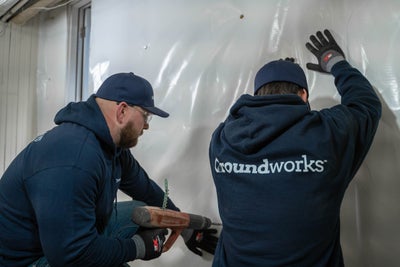
8. Avoid DIY. Trust the Pros for Lasting Waterproofing.
Contacting a professional basement waterproofing company near you is the best way to permanently waterproof your basement and eliminate worries about leaks and damage. Look for companies with experienced professionals, honest business practices, efficient and high-quality installation, industry-leading solutions, customized repairs, extensive warranties, and service and maintenance programs.
FAQs
Basements commonly experience some moisture after heavy rain, but you should not consider this to be a “normal” condition. Any amount of water can lead to issues like mold growth, health hazards, property damage, and foundation deterioration. It’s crucial to address any basement water intrusion promptly to prevent long-term problems.
Basements can leak at any time of the year. However, the risk increases during periods of heavy rain, such as in spring, during rapid snowmelt, or after significant weather events. Prolonged rainy seasons also heighten the likelihood of water problems.
Regularly inspecting your basement is crucial, particularly after heavy rainfalls or during periods of increased precipitation. Conducting monthly inspections can help you identify early signs of water intrusion, enabling prompt action to prevent further damage.
Contact Groundworks for Reliable Basement Waterproofing Solutions!
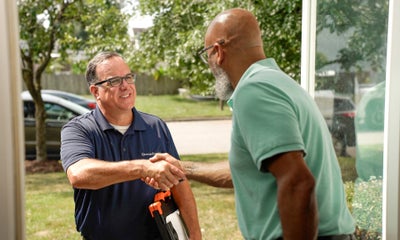
A leaking basement can lead to mold, health issues, and structural instability. To prevent these problems and ensure your home and family’s safety, trust professional basement waterproofing solutions.
Groundworks, serving Edmonton, Calgary, and other locations throughout Northern and Southern Alberta, has more than 30 years of experience helping homeowners create safe and healthy living environments. Contact us today to schedule a free inspection and estimate. We’ll evaluate your home’s condition and recommend solutions custom-fit to meet your needs.